跨文化交际作业
跨文化交际口语教程1答案

跨文化交际口语教程1答案
1、本题主要考察don't have和haven't(等词)的区别,根据以上几题,可知答案在B、C、D项,因为doesn't是助动词,后面加动词原型,排除D项。
接下来就是讨论B、C项,B项hasn't是没有的意思,而C项doesn't have是没有吃的意思,根据句意,可知应该是没有吃早饭,所以选C。
2、本题主要考察时态和第三人称单数形式,由every day可知该题是一般现在时,排除D,D是现在进行时。
Marry是单数,开头的助动词应该用Does,所以选C。
扩展资料:
(1)I have finished my homework. (我已经完成我的家庭作业)在这个例句中,用虚词“已经”来表示动作的完成,而在英语中,则是将句中的谓语动词finish转变成现在完成时结构have finished来表现finish这个动作已经发生过了。
(2)She is reading a book carefully. (她正在认真看书)在汉语中,用虚词“正“来表示“读书”这个动作正在进行,而英语中,则需要将“read”转变成现在进行时结构”is reading”
(3)He will be back in ten minutes. (十分钟后他将回来)在汉语中,用虚词“将”来表示将来的动作,而英语中则需要用一般将来时的结构“will +动词原形”来表现。
高中英语跨文化交际单选题50题
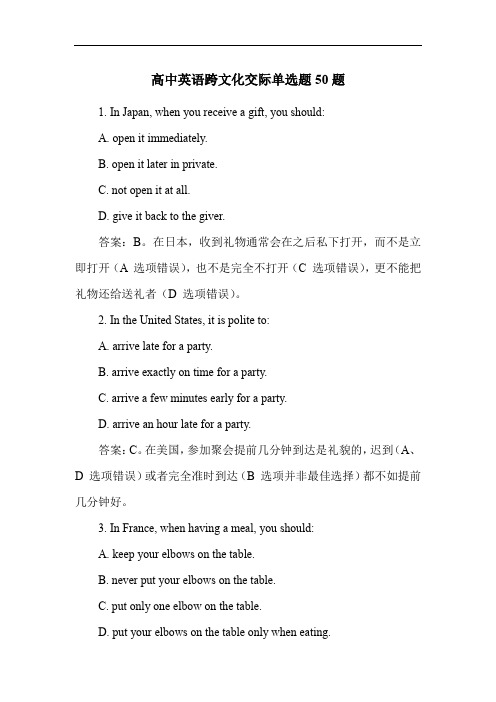
高中英语跨文化交际单选题50题1. In Japan, when you receive a gift, you should:A. open it immediately.B. open it later in private.C. not open it at all.D. give it back to the giver.答案:B。
在日本,收到礼物通常会在之后私下打开,而不是立即打开(A 选项错误),也不是完全不打开(C 选项错误),更不能把礼物还给送礼者 D 选项错误)。
2. In the United States, it is polite to:A. arrive late for a party.B. arrive exactly on time for a party.C. arrive a few minutes early for a party.D. arrive an hour late for a party.答案:C。
在美国,参加聚会提前几分钟到达是礼貌的,迟到(A、D 选项错误)或者完全准时到达(B 选项并非最佳选择)都不如提前几分钟好。
3. In France, when having a meal, you should:A. keep your elbows on the table.B. never put your elbows on the table.C. put only one elbow on the table.D. put your elbows on the table only when eating.答案:B。
在法国,用餐时不应该把胳膊肘放在桌子上。
A、C、D 选项都是错误的做法。
4. In China, when you meet an elder, you should:A. shake hands casually.B. bow deeply.C. nod slightly.D. greet with a hug.答案:B。
跨文化交际大作业
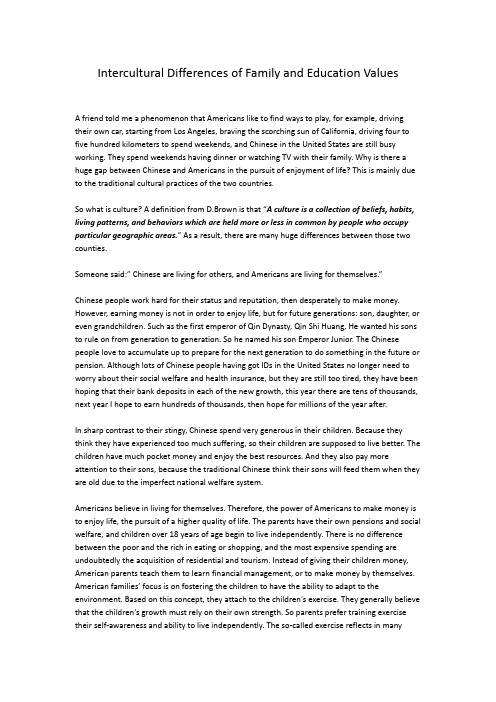
Intercultural Differences of Family and Education ValuesA friend told me a phenomenon that Americans like to find ways to play, for example, driving their own car, starting from Los Angeles, braving the scorching sun of California, driving four to five hundred kilometers to spend weekends, and Chinese in the United States are still busy working. They spend weekendshaving dinner or watching TVwith their family. Why is there a huge gap between Chinese and Americans in the pursuit of enjoyment of life?This is mainly due to the traditional cultural practices of the two countries.So what is culture? A definition from D.Brown is that“A culture is a collection of beliefs, habits, living patterns, and behaviors which are held more or less in common by people who occupy particular geographic areas.” As a result, there are many huge differences between those two counties.Someone said:”Chinese are living for others, and Americans are living for themselves.”Chinese peoplework hard for their status and reputation, then desperately to make money. However, earning money is not in order to enjoy life, but for future generations: son, daughter, or even grandchildren.Such as the first emperor of Qin Dynasty, Qin Shi Huang, He wanted his sons to rule on from generation to generation. So he named his son Emperor Junior. The Chinese people love to accumulate up to prepare for the next generation to do something in the future or pension. Although lots of Chinese people having got IDs in the United Statesno longer need to worry about their social welfare and health insurance, but they are still too tired, they have been hoping that their bank deposits in each of the new growth, this year there are tens of thousands, next year I hope to earn hundreds of thousands, then hope for millions of the year after.In sharp contrast to their stingy, Chinese spend very generous in their children. Because they thinkthey have experienced too much suffering, so their children are supposed to live better. The children have much pocket money and enjoy the best resources. And they also pay more attention to their sons, because the traditional Chinese think their sons will feed them when they are old due to the imperfect national welfare system.Americans believe in living for themselves. Therefore, the power of Americans to make money is to enjoy life, the pursuit of a higher quality of life. The parents have their own pensions and social welfare, and children over 18 years of age begin to live independently. There is no difference between the poor and the rich in eating or shopping, and the most expensive spending areundoubtedly the acquisition of residential and tourism. Instead of giving their children money, American parents teach them to learn financial management, or to make money by themselves. American families’focus is on fostering the childrento have the ability to adapt to the environment. Based on this concept, they attach to the children's exercise. They generally believe that the children's growth must rely on their own strength. So parents prefer training exercisetheir self-awareness and ability to live independently. The so-called exercise reflects in many respects,the exercise of labor and will. But the most fundamental is to adapt to the exercise of a variety of difficult environments and the ability to work. Through physical training, the kids develop the habits of independent consciousness. And their will also develop their own capacity strengths, wisdom, patience, independent viability and social responsibility.There are also some differences in family value. We Chinese all know that there are some important festivals through a year, such as Mid-autumn Festival and Spring Festival. When the festival comes, we need to come back home to have a sumptuous dinner with all the family members. This movement shows that Chinese are collectivism which is completely different with Americans. This point of view is much broader than Westerners’ which definition is limited to parents and children, and the following definitions are talking about the "family" may be used. First, the core of three generations of Chinese-style familyincludes three generations: grandparents, parents and children. This is the most commonly basic family unit.And the traditional Chinese family also includes generations of ancestors, although they have long been buried. Many people who have the same surname are recorded in the genealogies and often have their own family rules and family motto, and descendants for generations have to comply with. Some Chinese people have a strong sense of pride and proud of their long family history, and even some family can be traced back thousands of years ago.The special feelings of the family and respect for ancestorsof Chinese people make them feel cordial for those who are from the same city or region.Chinese people's "family" also extends to the concept of "nation", and "nation" of the Chinese character includes Chinese character "home". The Chinese people they belong to the "country" as the "home". As a result Chinese people have strong concept of nation, so old man would like to go back to hometown no matter where he is.However, the traditional American family is a "nuclear family." A nuclear family refers to a couple and their children. The average American family today has two or three childrenand maybe a few pets. In some cultures, people live close to their extended family. Several generations may even live together. But in America, only in a few cases does more than one household live under one roof.Many homes are run like a democracy. Each family member can have a say. A sense of equality often exists in American homes. Instead of fearing Mom and Dad, children may think of them as good friends. From an early age, children gain responsibility in handling money. They may receive a weekly allowance or even work part-time jobs. Often parents give children freedom to make their own decisions. Preschoolers choose what clothes to wear or which toys to buy. Young adults generally make their own choices about what career to pursue and whom to marry.After children being adult, they will leave their parents and even won’t come back for many years.Although we can find many differences between Chinese and American, we do not need to be afraid of communicating with them. If we can realize the differences and we can avoid being embarrassing and misunderstanding. That is why we learn Intercultural Communication.。
跨文化交际作业一
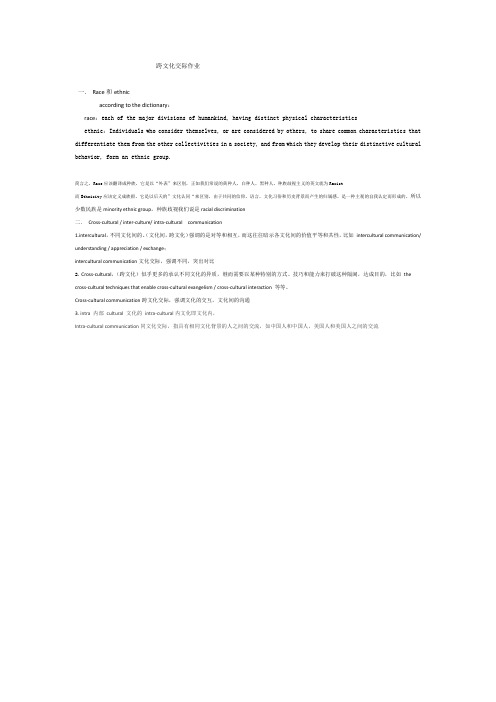
跨文化交际作业一.Race和ethnicaccording to the dictionary:race:each of the major divisions of humankind, having distinct physical characteristicsethnic:Individuals who consider themselves, or are considered by others, to share common characteristics that differentiate them from the other collectivities in a society, and from which they develop their distinctive cultural behavior, form an ethnic group.简言之,Race应该翻译成种族,它是以“外表”来区别,正如我们常说的黄种人,白种人,黑种人。
种族歧视主义的英文就为Racist而Ethnicity应该定义成族群,它是以后天的”文化认同“来区别,由于共同的信仰,语言,文化习俗和历史背景而产生的归属感,是一种主观的自我认定而形成的。
所以少数民族是minority ethnic group,种族歧视我们说是racial discrimination二.Cross-cultural / inter-culture/ intra-cultural communication1.intercultural,不同文化间的。
(文化间,跨文化)强调的是对等和相互,而这往往暗示各文化间的价值平等和共性,比如intercultural communication/ understanding / appreciation / exchange;intercultural communication文化交际,强调不同,突出对比2.Cross-cultural,(跨文化)似乎更多的承认不同文化的异质,继而需要以某种特别的方式、技巧和能力来打破这种隔阂,达成目的,比如the cross-cultural techniques that enable cross-cultural evangelism / cross-cultural interaction 等等。
Brief 081041107 李雨亭 跨文化交际作业Introduction of Masculinity and Femininity
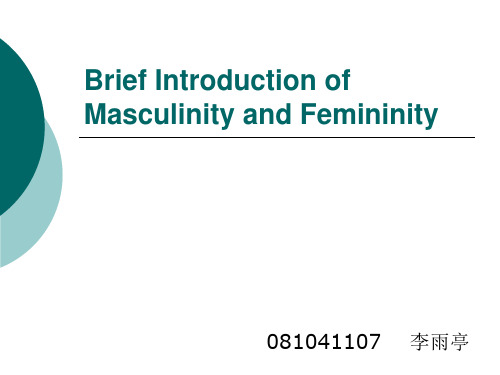
In masculine culture, power means the right to make others do what you want them to do.Mausculine people like to show off by being the biggest,best,and fastest.
Characteristics of Masculinity Culture
1,There is a little occupational segregation by gender. 2,There is relative gender equality. 3,Carees for males are optional. 4,More women are in powerful jobs. 5,Nurturing is highly valued. 6,The level of job-related stress is low.
Feminine Culture
In feminine societies, men and women are considered socially equal. Homosexuality is not a threat. Love and tenderness are for men and women alike. Intimate relationships without sex are allowed. Children need love, and parents spend much time with them.
While a country of low masculinity culture has a low level of differentiation and discrimination between genders. In these culture, females are treated equally as males in all aspects of the society.
23秋国家开放大学跨文化交际与汉语教学期末大作业参考答案
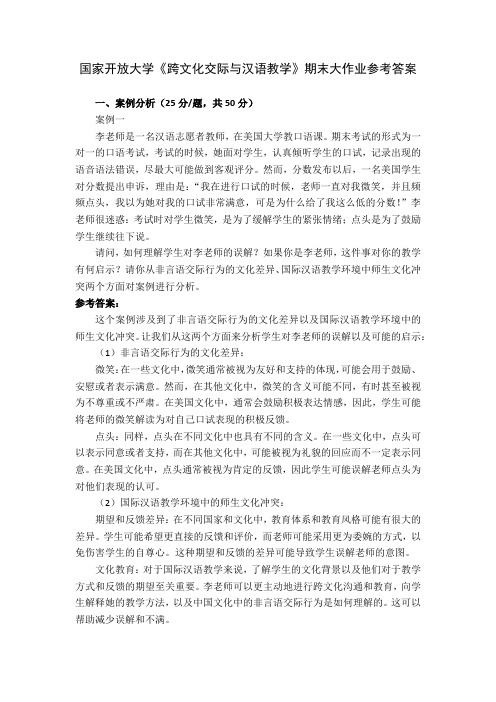
国家开放大学《跨文化交际与汉语教学》期末大作业参考答案一、案例分析(25分/题,共50分)案例一李老师是一名汉语志愿者教师,在美国大学教口语课。
期末考试的形式为一对一的口语考试,考试的时候,她面对学生,认真倾听学生的口试,记录出现的语音语法错误,尽最大可能做到客观评分。
然而,分数发布以后,一名美国学生对分数提出申诉,理由是:“我在进行口试的时候,老师一直对我微笑,并且频频点头,我以为她对我的口试非常满意,可是为什么给了我这么低的分数!”李老师很迷惑:考试时对学生微笑,是为了缓解学生的紧张情绪;点头是为了鼓励学生继续往下说。
请问,如何理解学生对李老师的误解?如果你是李老师,这件事对你的教学有何启示?请你从非言语交际行为的文化差异、国际汉语教学环境中师生文化冲突两个方面对案例进行分析。
参考答案:这个案例涉及到了非言语交际行为的文化差异以及国际汉语教学环境中的师生文化冲突。
让我们从这两个方面来分析学生对李老师的误解以及可能的启示:(1)非言语交际行为的文化差异:微笑:在一些文化中,微笑通常被视为友好和支持的体现,可能会用于鼓励、安慰或者表示满意。
然而,在其他文化中,微笑的含义可能不同,有时甚至被视为不尊重或不严肃。
在美国文化中,通常会鼓励积极表达情感,因此,学生可能将老师的微笑解读为对自己口试表现的积极反馈。
点头:同样,点头在不同文化中也具有不同的含义。
在一些文化中,点头可以表示同意或者支持,而在其他文化中,可能被视为礼貌的回应而不一定表示同意。
在美国文化中,点头通常被视为肯定的反馈,因此学生可能误解老师点头为对他们表现的认可。
(2)国际汉语教学环境中的师生文化冲突:期望和反馈差异:在不同国家和文化中,教育体系和教育风格可能有很大的差异。
学生可能希望更直接的反馈和评价,而老师可能采用更为委婉的方式,以免伤害学生的自尊心。
这种期望和反馈的差异可能导致学生误解老师的意图。
文化教育:对于国际汉语教学来说,了解学生的文化背景以及他们对于教学方式和反馈的期望至关重要。
《学生没写作业怎么办》(跨文化交际案例)
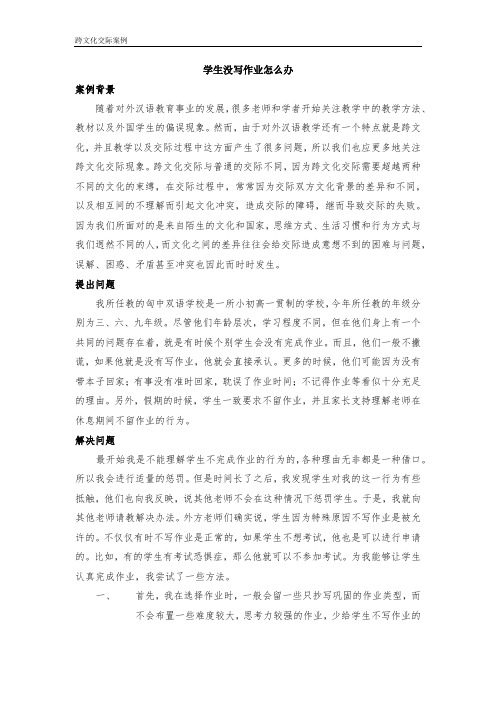
学生没写作业怎么办案例背景随着对外汉语教育事业的发展,很多老师和学者开始关注教学中的教学方法、教材以及外国学生的偏误现象。
然而,由于对外汉语教学还有一个特点就是跨文化,并且教学以及交际过程中这方面产生了很多问题,所以我们也应更多地关注跨文化交际现象。
跨文化交际与普通的交际不同,因为跨文化交际需要超越两种不同的文化的束缚,在交际过程中,常常因为交际双方文化背景的差异和不同,以及相互间的不理解而引起文化冲突,造成交际的障碍,继而导致交际的失败。
因为我们所面对的是来自陌生的文化和国家,思维方式、生活习惯和行为方式与我们迥然不同的人,而文化之间的差异往往会给交际造成意想不到的困难与问题,误解、困惑、矛盾甚至冲突也因此而时时发生。
提出问题我所任教的匈中双语学校是一所小初高一贯制的学校,今年所任教的年级分别为三、六、九年级。
尽管他们年龄层次,学习程度不同,但在他们身上有一个共同的问题存在着,就是有时候个别学生会没有完成作业。
而且,他们一般不撒谎,如果他就是没有写作业,他就会直接承认。
更多的时候,他们可能因为没有带本子回家;有事没有准时回家,耽误了作业时间;不记得作业等看似十分充足的理由。
另外,假期的时候,学生一致要求不留作业,并且家长支持理解老师在休息期间不留作业的行为。
解决问题最开始我是不能理解学生不完成作业的行为的,各种理由无非都是一种借口。
所以我会进行适量的惩罚。
但是时间长了之后,我发现学生对我的这一行为有些抵触,他们也向我反映,说其他老师不会在这种情况下惩罚学生。
于是,我就向其他老师请教解决办法。
外方老师们确实说,学生因为特殊原因不写作业是被允许的。
不仅仅有时不写作业是正常的,如果学生不想考试,他也是可以进行申请的。
比如,有的学生有考试恐惧症,那么他就可以不参加考试。
为我能够让学生认真完成作业,我尝试了一些方法。
一、首先,我在选择作业时,一般会留一些只抄写巩固的作业类型,而不会布置一些难度较大,思考力较强的作业,少给学生不写作业的机会。
(0859)《跨文化交际》网上作业题及答案
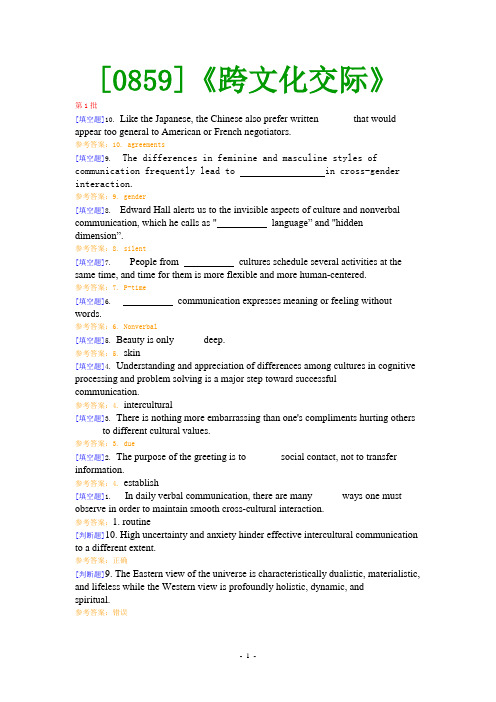
[0859]《跨文化交际》第1批[填空题]10. Like the Japanese, the Chinese also prefer written ______ that would appear too general to American or French negotiators.参考答案:10. agreements[填空题]9. The differences in feminine and masculine styles of communication frequently lead to in cross-gender interaction.参考答案:9. gender[填空题]8. Edward Hall alerts us to the invisible aspects of culture and nonverbal communication, which he calls as " language” and "hidden dimension”.参考答案:8. silent[填空题]7. People from cultures schedule several activities at the same time, and time for them is more flexible and more human-centered.参考答案:7. P-time[填空题]6. communication expresses meaning or feeling without words.参考答案:6. Nonverbal[填空题]5. Beauty is only _____ deep.参考答案:5. skin[填空题]4. Understanding and appreciation of differences among cultures in cognitive processing and problem solving is a major step toward successful ______ communication.参考答案:4. intercultural[填空题]3. There is nothing more embarrassing than one's compliments hurting others _____ to different cultural values.参考答案:3. due[填空题]2. The purpose of the greeting is to ______ social contact, not to transfer information.参考答案:4. establish[填空题]1. In daily verbal communication, there are many _____ ways one must observe in order to maintain smooth cross-cultural interaction.参考答案:1. routine[判断题]10. High uncertainty and anxiety hinder effective intercultural communication to a different extent.参考答案:正确[判断题]9. The Eastern view of the universe is characteristically dualistic, materialistic, and lifeless while the Western view is profoundly holistic, dynamic, and spiritual.参考答案:错误[判断题]8. Due to the cultural differences, interpreting in intercultural encounters is possible but difficult.参考答案:正确[判断题]7. Cultural differences can generate positive impacts on negotiation as people can learn from each other.参考答案:错误[判断题]6.A lady might be feminine, masculine or a combination of both.参考答案:正确[判断题]1) 5. Environment is one of the five study areas that nonverbal communication covers.参考答案:正确[判断题]4. "Dragon” means the same to the Westerners as "龙” to the Chinese.参考答案:错误[判断题]3. Sometimes the Chinese way of showing modesty must be considered as fishingfor compliments.参考答案:正确[判断题]2. All cultures require and value politeness, but the ways in which politenessis ` achieved may vary significantly.参考答案:正确[判断题]1. All people of the same nationality will have the same culture.参考答案:错误第2批[论述题]Define the following terms:1. Nonverbal communication2. Body language/Kinesics3. world view4. the Judeo-Christian tradition5. knowledge6. stereotype参考答案:1. Nonverbal communication is the process by which nonverbal behaviors are used, either singly or in combination with verbal behaviors, in the exchange and interpretation of messages within a given situation or context.2. Body language refers to the meaning representing devices as facial expressions and eye behaviors, gestures, and postures.3. A comprehensive world view (or worldview) is the fundamental cognitive orientation of an individual or society encompassing natural philosophy; fundamental existential and normative postulates; or themes, values, emotions, and ethics4. Judeo?Christian (sometimes written as Judaeo?Christian) refers to a set of beliefs and ethics held in common by Judaism and Christianity. It is a common term in American cultural and political rhetoric.5. Knowledge is defined by the Oxford English Dictionary as (i) expertise, and skills acquired by a person through experience or education; the theoretical or practical understanding of a subject; (ii) what is known in a particular field or in total; facts and information; or (iii) awareness or familiarity gained by experience of a fact or situation.6. A stereotype or "stereotypes" is a commonly held public belief about specific social groups or types of individuals. The concepts of "stereotype" and "prejudice" are often confused with many other different meanings. Stereotypes are standardized and simplified conceptions of groups based on some prior assumptions.第3批[论述题]Define the following terms.1. nonverbal communication2. culture shock3. gender4. stereotype5. body language参考答案:1.Nonverbal communication is the process by which nonverbal behaviors are used, either singly or in combination with verbal behaviors, in theexchange and interpretation of messages within a given situation or context.2.Culture shock is precipitated by the anxiety that results from losing all our familiar signs and symbols of social intercourse. The main cause of cultu re shock is displacement from our "home” culture. This lack of common experiences and familiar surroundings creates varying degrees of consequences.3.Gender and sex are not synonymous. Sex is determined by genetics and biology, while gender is produced and reproduced by society. Societies create meanings of gender; in turn, individuals become gendered as they embody social prescriptions in their personal identities.4.Stereotype is a complex form of categorization that mentally organizes our experiences and guides our behavior toward a particular group of people. There are a number of reasons that stereotypes, as a form of classification, hamper intercultural communication.5.Body language refers to the meaning representing devices as facial expressions and eye behaviors, gestures, and postures.[论述题]Analyze the following cases,and then answer the given questions.Case 1How would you explain the Director's behavior toward Katherine? How would you make the Director understand why Katherine felt frustrated and angry?Katherine came to Beijing in 1998 and found a job as an English teacher in a foreign language institute. Soon after her classes began, she found that her students showed no interest in her teaching style. Quite a few of them avoided attending her class. She was feeling quite upset and discouraged so she decided to ask the Director, Prof. Wang reviewed his timetable and suggested they meet at ten o` clock on Thursday morning. When Thursday came, Katherine arrived at Prof. Wang` office at the exactly ten o` clock finding him talking with another teacher in Chinese. Seeing that she had come, Prof. Wang smiled and gestured her to sit down. Katherine sat down and the professor excused himself and continued to talk with the other teacher. After five minutes, he finished hisconversation, and apologized to Katherine, and began to focus his attention on her situation. Prof. Wang showed great concern and asked her what the problem was. Just as she was discussing her problem, another Chinese teacher interrupted, with a form that required the Director` s signature. The Director smiled, apologized to Katherine again, and turned to talk with the Chinese teacher in Chinese. Katherine became impatient, and wondered why their discussion should be interrupted since she had made an appointment. Also, she was upset and frustrated that they continued to speak Chinese in front of her. Although their talk continued, she was apparently unhappy about what had happened.Case 2Why does Jay refuse to ask his professor or classmen to clarify the directions for his paper?Jay is having difficulty in writing a paper for his communication class, because he's not sure what the professor wants. When he mentions this to his friend Ellen, she suggests he ask the professor or a classmen to clarify directions. Jay refuses, saying "I can figure it out on my own”.参考答案:2. In this case, Jay's unwillingness to ask others for help in understanding his assignment is a sign of his masculine emphasis on independence. As some scholars point out rather humorously, men invariably resist asking directions when they are lost in the road while women do not hesitate to ask strangers for help. What we have discussed about gender identity help us understand this difference. Because women initially develop identity within the first relationships have an undertone of danger-they could jeopardize independence. So Jay's refusal to ask others for help reflects the masculine emphasis on maintaining autonomy and not appearing weak or incompetent. Unless Ellen realizes this difference between them, Jay's behavior will continue to baffle her.)[填空题]10.One of the most fundamental ways culture shapes our being is throughexplicit and implicit ________ about our relationship to the nature of the universe and to the non-human natural world.参考答案:10. teachings[填空题]9. Native speakers need to admit that difficulty in understanding _______ also occurs among native speakers and reminds non-native speakers to be open about explanations given.参考答案:9. humor[填空题]8. The American _______ is to conduct business in an efficient manner,while compromises may be part of the outcome.参考答案:8. n orm[填空题]7. The differences in feminine and masculine styles of communication frequently lead to ________in cross-gender interaction.参考答案:7. misunderstanding[填空题]6. communication expresses meaning or feeling without words.参考答案:6. Nonverbal[填空题]5.Understanding and appreciation of differences among cultures in cognitive processing and problem solving is a major step toward successful ______ communication.参考答案: 5. intercultural[填空题]pliments and compliment responses are an _______ part of daily verbal communication.参考答案:4. essential[填空题]3. Being unaware of the difference, intercultural communication ______ occurs here and there.参考答案:3. breakdown[填空题]2. When communicating with each other, each person ___________ and sends messages, and in turn receives and decodes messages.参考答案:2. encodes[填空题]1.Intercultural competence requires sufficient knowledge, suitable _______, and skilled actions.参考答案:1. motivations[单选题]10. The Chinese phrase "知识分子” has the same meaning as "intellectual”.A:TB:F参考答案:B[单选题]9.Although cultural stereotype has its limitations(over-generalization), it still contributes to a person's cultural cognition.A:TB:F参考答案:A[单选题]8.It is very important for nonnative speakers to learn to communicate incomprehension through idiomatic expressions as well as nonverbal gestures.A:TB:F参考答案:A[单选题]7.We should avoid unconsciously adopting our cultural rules and norms in communication in the American or British context.A:TB:F参考答案:A[单选题]6.In Asian cultures, signed agreements are far less important than keeping the interdependent, interwoven organizations involved in a good relationship.A:TB:F参考答案:A[单选题]5. The first and last principle for effective cross-gender communication is suspending judgment.A:TB:F参考答案:A[单选题]4. The social functions of Chinese and English compliments are roughly the same.A:TB:F参考答案:A[单选题]3. There are as many similarities as dissimilarities between English proverbs and Chinese proverbs.A:TB:F参考答案:B[单选题]2. The Chinese way of showing concern is usually appreciated by the Westerners.A:TB:F参考答案:B[单选题]1. Culture is a static entity while communication is a dynamic process.A:TB:F参考答案:B第4批[判断题]8.It is very important for nonnative speakers to learn to communicate incomprehension through idiomatic expressions as well as nonverbal gestures.参考答案:正确[判断题]7.We should avoid unconsciously adopting our cultural rules and norms in communication in the American or British context.参考答案:正确[判断题]5. The first and last principle for effective cross-gender communication is suspending judgment.参考答案:正确[判断题]4. The social functions of Chinese and English compliments are roughly the same.参考答案:正确[判断题]2. The Chinese way of showing concern is usually appreciated by the Westerners.参考答案:错误[判断题]1. Culture is a static entity while communication is a dynamic process.参考答案:错误[判断题]9.Although cultural stereotype has its limitations(over-generalization), it still contributes to a person's cultural cognition.参考答案:正确[论述题]Analyze the following casesCase 1Why did the two Korean interpreters continue to study the Chinese female teachers` trousers?In 1987, a delegation consisting of four Chinese English experts went to Pingyong Foreign Language University to train faculty to be top-level simultaneous interpreters for the 13th International Youth Festival. Of the four experts, two were men and two were women. The two men were dressed in suits with ties and the two women were typically dressed in trousers and their typical business clothes. An authority from Pingyong Foreign Language University and two Korean interpreters greeted them at the Pingyong Railway Station. Surprisingly, while exchanging a few formal remarks, the two interpreters` eyes consistently observed the two Chinese female teachers' trousers. The younger teacher, sensed something and repeatedly checked their trousers and shoes to see if they were dirty or marked. About half an hour later, they arrived at the hotel where they would be staying during their mission. The two interpreters showed eachof them to their rooms to give them an opportunity to freshen up before the formal introductions. In a couple of minutes, the four Chinese teachers gathered in one of the rooms, where the head of the university and the two interpreters introduced themselves further and briefed them on the training program. While talking, the two interpreters seemed to continue to study the two female teachers` trousers. At first, they thought that the Korean interpreters were too embarrassed to look straight in the eyes of a woman. Later this assumption was proved wrong. The four Chinese teachers remained a bit puzzled and did not know what was going on…Case 2Could you explain to Dick why Chen Liang walked into the cafeteria without waiting for him?After graduating from Beijing International Studies University, Chen Liang pursued an MA program at a university in Boston, the U.S. Early in the program, he made friends with some of the American friends, Dick, asked Chen to join him in the university cafeteria. On their way they ran into Dick's girlfriend, Lisa, who was on her way to a lecture. Walking shoulder to shoulder, Dick and Lisa carried on an intimate conversation, as if they hadn't seen each other for ages. Meanwhile, Chen Liang was walking behind them, not taking part in the conversation. When they were nearing the cafeteria Lisa said she had to leave for the lecture. Dick turned away and walked off toward the cafeteria. When Dick looked up, he saw Chen waking into the cafeteria. Dick was puzzled as to why Chen didn't wait for him, and went to the cafeteria alone.参考答案:1. Comment: this is a typical cultural clash between Chinese and Westerners. There is a great difference in the concept of appointment and its behavior pattern in different cultures. To Americans, an appointment is a confirmation to meet at a precise time. If an appointment is scheduled, both parties should respect the appointment time, it should not be interrupted by other things or people. In addition, Westerners are goodtimekeepers; they adhere strictly to schedules. However, Chinese view appointment in a more flexible manner. They are more causal about commitments. This difference in attitudes toward appointment was the roof of Katherine` s unhappiness. Since the Director made a ten o` clock appointment, he should have tried to avoid any interruption. However, when Katherine arrived on time, the Director was still talking with another teacher. When their meeting finally began, it was interrupted again. There is no wonder Katherine became frustrated and angry.2. Suggested answer:In public, the norms of expressing one's feeling and affections toward the opposite sex vary across culture. In Asia and some countries around the Mediterranean Sea, it is acceptable to have body contact between the same sexes in public, but not between the opposite sexes, especially in front of the friends. Chen left because he felt awkward witnessing them hugging and kissing. This shows that Dick knows nothing about the natural response of the Chinese to certain behaviors. Similarly, Chen Liang's behavior shows that he is also in the dark about American behaviors.[填空题]9. In broad terms, nonverbal communication covers four areas: timelanguage (temporal language or chronemics), space language (spatial language or proxemics), language(body movement orkinesics), and paralanguage (voice modulation).参考答案:9. body[论述题]Define the following terms.1. nonverbal communication2. economic globalization3. gender4. linear time5. intercultural communication competence参考答案:1.Nonverbal communication is the process by which nonverbal behaviors are used, either singly or in combination with verbal behaviors, in the exchange and interpretation of messages within a given situation or context.2.No country is the dominant economic force in the world. Economic expansion in globalization has resulted in multinational corporations participating in joint ventures, licensing agreements and other international business arrangements.3.Gender and sex are not synonymous. Sex is determined by genetics and biology, while gender is produced and reproduced by society. Societies create meanings of gender; in turn, individuals become gendered as they embody social prescriptions in their personal identities.4.The West views time either as an arrow or as a moving river that comes from a distant place in the past and goes to an equally distant place in the future. In this linear view of time, history is goal-directed and gradually progressing in a certain direction.5.Intercultural communication competence (ICC competence) is the ability to effectively and appropriately execute communication behaviors to elicit a desired response in a specific environment.[判断题]10. The Chinese phrase "知识分子” has the same meaning as "intellectual”.参考答案:错误[判断题]6.In Asian cultures, signed agreements are far less important than keeping the interdependent, interwoven organizations involved in a good relationship.参考答案:正确[判断题]3. There are as many similarities as dissimilarities between English proverbs and Chinese proverbs.参考答案:错误[填空题]10.According to researchers, there are two primary influences ongender : family communication, particularly betweenmothers and children, and recreational interaction among children.参考答案:10. socialization[填空题]8. Like the Japanese, the Chinese also prefer written ______ that would appear too general to American or French negotiators.参考答案:8. agreements[填空题]7. To develop ________means being able to see things from the point ofview of others so that we can better know and adjust to the other people.参考答案:7. empathy[填空题]6. We need to understand what is ordinarily done in a _______ in order to understand and laugh at messages that are the " out of the ordinary”.参考答案:6. culture[填空题]5.A term in one language does not necessarily have a ______ in the other language.参考答案:5. counterpart[填空题]4.There is nothing more embarrassing than one's compliments hurtingothers _____ to different cultural values.参考答案:4. due[填空题]3.Understanding and appreciation of differences among cultures in cognitive processing and problem solving is a major step toward successful ______ communication.参考答案:3. intercultural[填空题]2.Being unaware of the difference, intercultural communication ______ occurs here and there.参考答案:2. breakdown[填空题]1.Intercultural communication occurs whenever there is communication between people from different cultural ______________.参考答案:1. backgrounds。
跨文化交际 作业论文
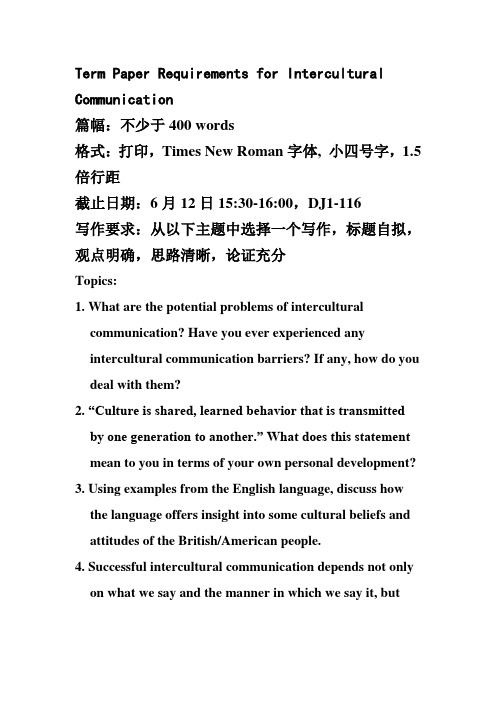
Term Paper Requirements for Intercultural Communication篇幅:不少于400 words格式:打印,Times New Roman字体, 小四号字,1.5倍行距截止日期:6月12日15:30-16:00,DJ1-116写作要求:从以下主题中选择一个写作,标题自拟,观点明确,思路清晰,论证充分Topics:1. What are the potential problems of interculturalcommunication? Have you ever experienced anyintercultural communication barriers? If any, how do you deal with them?2. “Culture is shared, learned behavior that is transmittedby one generation to another.” What does this statement mean to you in terms of your own personal development?3. Using examples from the English language, discuss howthe language offers insight into some cultural beliefs and attitudes of the British/American people.4. Successful intercultural communication depends not onlyon what we say and the manner in which we say it, butalso on the behavior we display. Use examples to support this statement.The Potential Problems of Intercultural CommunicationWith the development of economic globalization,the potential problems of intercultural communication that arise in interactions between people from different cultures.I have never experienced any intercultural communication barriers,but to learn the course of coss cultural communication.I have learned s lot of information about Intercultural Communication.As far as I am concerned,there are many problems in intercultural communication.Firstly,the language barrier is a major obstacle in cross-cultural communication.For example,two people from different countries, speaking different languages and knew nothing about each other's languages, even they can make use of means of communication such as gestures, figures, but because of the language barrier, the two sides is difficult to understand each other very well.Secondly, non- verbal behavior information is fuzzy complex and unconscious.So it is difficult for us to understand other countries’ culture.Thirdly, intercultural communication has other problems.For one,culture set which is used to organize and simplify the perception of others as a selection process. Cultural stereotype is often highly infectious, once formed, ingrained, will be in quite long period of time to be used in groups or individuals.And it affects information processing method, the problem simplistic, generalization and exaggerate.Even cultural stereotype is strong in an attempt to get the facts out.For another, cultural bias. It is often distorted, misleading in intercultural communication.What’s more,it is ethnocentrism.Ethnocentrism is a kind of thought culture is superior to other cultures, the broad sense is to members of other groups.It will lead to the speaker on the misrepresentations, misleading people to other groups to make false assumptions. Last but not least,the psychology of a stranger would make two strangers meet willgenerate tension, alert, withdrawal or defense psychological tendency.To sum up,I found some methods to overcome the potential problems.First of all, To obtain the knowledge of the target culture and communication skills.As well as the position, emotion, behavior patterns transmit the native culture to the target culture.Then developing the ability of language, communicative competence, pragmatic competence.For instance,fostering the intercultural awareness to strengthen cultural exchanges.Then we should do as the Romans do the degree of master that we called "Seek common ground on major issues while reserving differences on minor points".Finally,to imaginate and share the emotions and experience with others in cross-cultural communication.All in all,people of different cultures appear a series of problems when they communicate to others.But we must know the potential barriers to the formation and find out the feasible countermeasures to overcome obstacles.So that we will promote the world cultural exchange and development.。
从跨文化交际的角度看学生翻译作业中的问题
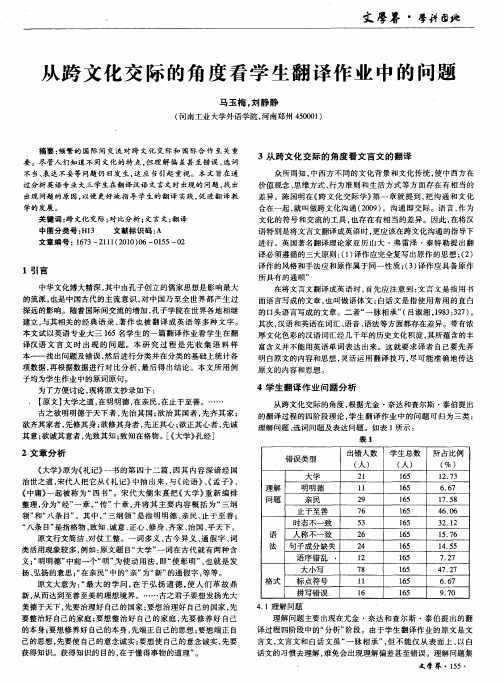
表1
【 原文 】 大学之道 , 明明德 , 在 在亲民 , 在止于至善 。……
古之欲 明明德于天下 者 , 治其 国; 先 欲治其 国者 , 先齐其 家 ;
欲齐其家者 , 先修其 身 ; 欲修其身者 , 先正其心 ; 欲正其 心者 , 先诚
文 謦暑 ・摩j围北 } }
从 跨 文 化 交 际 的角 度 看 学 生 翻 译 作 业 中 的 问题
马玉梅 , 静静 刘
( 河南工业大学外 语学院 , 河南郑州 4 0 0 ) 50 1
摘要: 频繁的 国际 问交流 对跨 文化 交际和 国际合 作 至关重
要 。尽 管人 们 知 道 不 同文 化 的 特 点 , 理 解 偏 差 甚 至 错 误 、 词 但 选 不 当、 达 不 妥 等 问题 仍 旧发 生 , 应 当 引起 重 视 。 本 文 旨在 通 表 这
所 具 有 的通 顺 ”
1引言
中华文化博大精深 , 中由孔子创立的儒家思想是影响最大 其
在将文言文 翻译成英语 时 , 首先应注 意到 : 文言文是 指用书 面语言写成 的文章 , 也叫做语体 文 ; 白话 文是指 使用常用 的直 白
的流派 , 也是 中国古代的主流 意识 , 中国乃 至全世 界都产生 过 对
项数据 , 再根据数据进行对 比分 析 , 最后得 出结论 。本文 所用 例
子均为学生作业 中的原词原句 。 为了方便讨论 , 现将 原文抄 录如下 :
.
4学生翻 译作 业 问题分析
从跨文化交际的角度 , 根据尤金 ・ 奈达 和查尔斯 ・ 泰伯提出 的翻译 过程的四阶段理论 , 学生 翻译 作业 中的问题 可归为三类 :
跨文化交际课后作业

Judy and Carman are talking with each other, while their children are playing together. Through the conversation between Judy and Carman, there are some problems. Judy has invited Carman for a date for twice but actually she never said an exact time so they didn’t get together. Is Judy dissatisfied with Carman? Absolutely not, so why?According the seven C’s Principles of Communication, effective communication has features of completeness, conciseness, consideration, concreteness, courtesy, clearness and correctness. However, Judy’s invitation didn’t satisfy the principles of completeness, concreteness and clearness. Judy’s invitation is noneffective. And there are four reasons for why she said that:Firstly, she wants to be polite to Carman. They are talking friendly and this sentences express Judy being respectful of Carman. Secondly, she wants to make the conversation closer. In the beginning, they all sharing their own things about their children and family, Judy’s invitation makes association between them, which could help them a closer relation. Thirdly, that makes it easy to start a conversation when they meet again. There is always topic for them to talk with each other the next time they meet. Finally, maybe she wants to end this conversation.I n conclusion, Judy’s noneffective invitation means that she doesn’t want to invite Carman, and that’s just a formula. Carman should know this formula when Judy invites her without exact and detailed information.。
初二英语跨文化交际用语练习题40题含答案解析
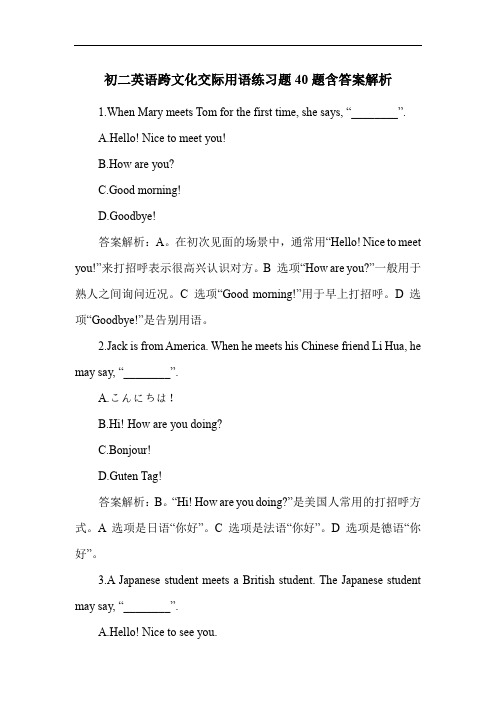
初二英语跨文化交际用语练习题40题含答案解析1.When Mary meets Tom for the first time, she says, “________”.A.Hello! Nice to meet you!B.How are you?C.Good morning!D.Goodbye!答案解析:A。
在初次见面的场景中,通常用“Hello! Nice to meet you!”来打招呼表示很高兴认识对方。
B 选项“How are you?”一般用于熟人之间询问近况。
C 选项“Good morning!”用于早上打招呼。
D 选项“Goodbye!”是告别用语。
2.Jack is from America. When he meets his Chinese friend Li Hua, he may say, “________”.A.こんにちは!B.Hi! How are you doing?C.Bonjour!D.Guten Tag!答案解析:B。
“Hi! How are you doing?”是美国人常用的打招呼方式。
A 选项是日语“你好”。
C 选项是法语“你好”。
D 选项是德语“你好”。
3.A Japanese student meets a British student. The Japanese student may say, “________”.A.Hello! Nice to see you.B.Ohayo!C.Good afternoon!D.Hallo!答案解析:A。
在跨文化交际中,“Hello! Nice to see you.”比较通用。
B 选项“Ohayo!”是日语“早上好”。
C 选项“Good afternoon!”是下午打招呼用语。
D 选项“Hallo!”是德语“你好”。
4.When a Canadian meets an Australian, they may start the conversation with “________”.A.G’day!B.Hello! What’s up?C.Bonjour!D.Hi! How’s it going?答案解析:D。
跨文化交际案例
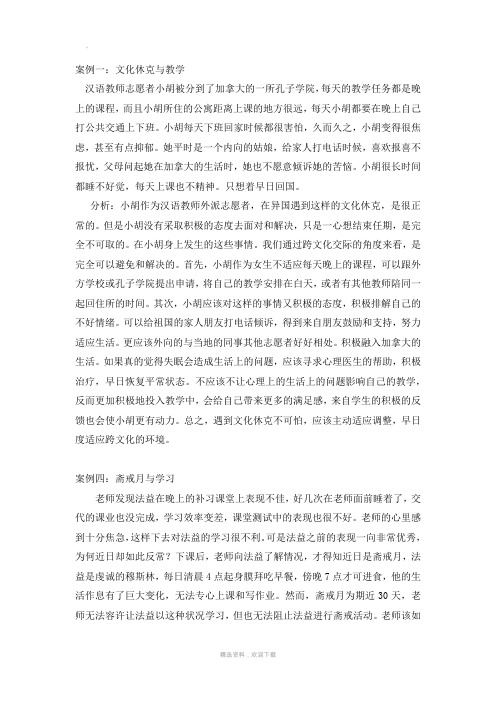
案例一:文化休克与教学汉语教师志愿者小胡被分到了加拿大的一所孔子学院,每天的教学任务都是晚上的课程,而且小胡所住的公寓距离上课的地方很远,每天小胡都要在晚上自己打公共交通上下班。
小胡每天下班回家时候都很害怕,久而久之,小胡变得很焦虑,甚至有点抑郁。
她平时是一个内向的姑娘,给家人打电话时候,喜欢报喜不报忧,父母问起她在加拿大的生活时,她也不愿意倾诉她的苦恼。
小胡很长时间都睡不好觉,每天上课也不精神。
只想着早日回国。
分析:小胡作为汉语教师外派志愿者,在异国遇到这样的文化休克,是很正常的。
但是小胡没有采取积极的态度去面对和解决,只是一心想结束任期,是完全不可取的。
在小胡身上发生的这些事情。
我们通过跨文化交际的角度来看,是完全可以避免和解决的。
首先,小胡作为女生不适应每天晚上的课程,可以跟外方学校或孔子学院提出申请,将自己的教学安排在白天,或者有其他教师陪同一起回住所的时间。
其次,小胡应该对这样的事情又积极的态度,积极排解自己的不好情绪。
可以给祖国的家人朋友打电话倾诉,得到来自朋友鼓励和支持,努力适应生活。
更应该外向的与当地的同事其他志愿者好好相处。
积极融入加拿大的生活。
如果真的觉得失眠会造成生活上的问题,应该寻求心理医生的帮助,积极治疗,早日恢复平常状态。
不应该不让心理上的生活上的问题影响自己的教学,反而更加积极地投入教学中,会给自己带来更多的满足感,来自学生的积极的反馈也会使小胡更有动力。
总之,遇到文化休克不可怕,应该主动适应调整,早日度适应跨文化的环境。
案例四:斋戒月与学习老师发现法益在晚上的补习课堂上表现不佳,好几次在老师面前睡着了,交代的课业也没完成,学习效率变差,课堂测试中的表现也很不好。
老师的心里感到十分焦急,这样下去对法益的学习很不利。
可是法益之前的表现一向非常优秀,为何近日却如此反常?下课后,老师向法益了解情况,才得知近日是斋戒月,法益是虔诚的穆斯林,每日清晨4点起身膜拜吃早餐,傍晚7点才可进食,他的生活作息有了巨大变化,无法专心上课和写作业。
初中优秀特色作业
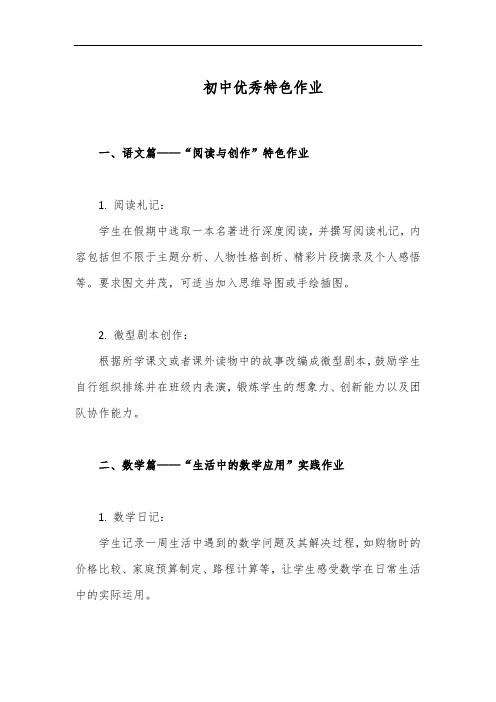
初中优秀特色作业
一、语文篇——“阅读与创作”特色作业
1. 阅读札记:
学生在假期中选取一本名著进行深度阅读,并撰写阅读札记,内容包括但不限于主题分析、人物性格剖析、精彩片段摘录及个人感悟等。
要求图文并茂,可适当加入思维导图或手绘插图。
2. 微型剧本创作:
根据所学课文或者课外读物中的故事改编成微型剧本,鼓励学生自行组织排练并在班级内表演,锻炼学生的想象力、创新能力以及团队协作能力。
二、数学篇——“生活中的数学应用”实践作业
1. 数学日记:
学生记录一周生活中遇到的数学问题及其解决过程,如购物时的价格比较、家庭预算制定、路程计算等,让学生感受数学在日常生活中的实际运用。
2. 数学建模项目:
选择一个生活中的实际问题(如城市交通拥堵问题、小区绿化面积规划等),引导学生利用所学知识建立数学模型,并提出解决方案。
三、英语篇——“跨文化交际”实践作业
1. 国际友人书信交流:
利用网络平台与国外同龄人进行英文书信交流,了解不同国家的文化习俗,提高书面表达和跨文化交际能力。
2. 英语配音秀:
选择一部英文动画短片或电影片段进行配音,并录制视频,提交作品的同时附上台词理解和角色揣摩的文字说明。
四、科学实验报告——“动手做科学”探究性作业
学生自主选择或教师指定一项科学实验,如观察种子发芽过程、制作简易太阳能小车等,完成实验后,编写详细的实验报告,包括实验目的、步骤、结果、结论及反思等部分。
以上各科特色作业旨在打破传统作业模式,倡导主动学习和实践
探索,培养学生的创新思维、批判性思考和解决问题的能力,使作业不仅成为检验学习成果的工具,更成为促进学生全面发展的有效途径。
跨文化交际采访报告
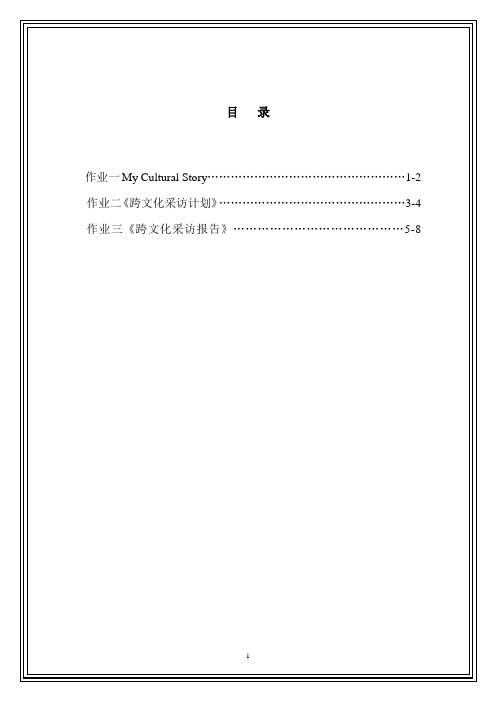
种藐视。
最为注意的是与尼日利亚人交谈的时候,不要盯视对方,他们忌讳对方盯视自己,因为这是不尊重人的举止。
而中国人认为聊天时看着对方的眼睛是一种尊重。
3.对客人问长问短,可能会侵犯客人的隐私,或者有些问题是客人不愿回答的,这时客人可能会表现出不耐烦,尼日利亚人在往后的交往中对那一个客人可能不会再像最初的那么热情。
4.随着社会的不断发展,等级观念会不会越来越减弱。
因为等级观念是一种落后的、封建的文化。
在社会发展的定义上,可以说是错误的思想观念。
作业三:《跨文化采访报告》40%跨文化采访报告1.基本情况:采访者的基本情况Name: ***Date of birth:Male/Female: FemaleCountry: ChinaRegion of country where you live:In the Asian region Religion:noLanguages I speak:Chinese被采访者的基本情况Name: Ma KeDate of birth: 1997-3-16Male/Female:MaleCountry : NigeriaRegion of country where he/she live: AfricaWhere is he/she living now? He is Live in China Religion:IslamLanguages he/ she speak: English2.在采访前你对采访对象和采访话题的预期和采访后的感觉是否有差距? 差距有多大?(5%)有差距差距有点大对采访对象:采访对象很热情,和他聊天非常的有趣。
尼日利亚有许多部落,所以各族习俗和文化有很大的差别。
有一个部落十分注重礼节,但是马可告诉我他所在的部落虽然注重礼仪,但是并没有那么严肃。
而且他对其他部落的礼仪文化也有一定的了解。
对采访话题:他们那边的大部分人都是待人比较热情友好的,对待陌生人也如此。
华师17年3月课程考试《跨文化交际》作业考核试题
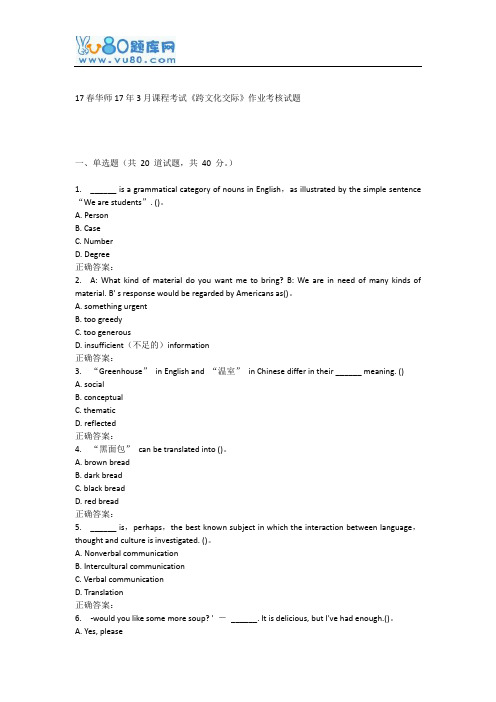
17春华师17年3月课程考试《跨文化交际》作业考核试题一、单选题(共20 道试题,共40 分。
)1. ______ is a grammatical category of nouns in English,as illustrated by the simple sentence “We are students”. ()。
A. PersonB. CaseC. NumberD. Degree正确答案:2. A: What kind of material do you want me to bring? B: We are in need of many kinds of material. B' s response would be regarded by Americans as()。
A. something urgentB. too greedyC. too generousD. insufficient(不足的)information正确答案:3. “Greenhouse”in English and “温室”in Chinese differ in their ______ meaning. ()A. socialB. conceptualC. thematicD. reflected正确答案:4. “黑面包”can be translated into ()。
A. brown breadB. dark breadC. black breadD. red bread正确答案:5. ______ is,perhaps,the best known subject in which the interaction between language,thought and culture is investigated. ()。
A. Nonverbal communicationB. Intercultural communicationC. Verbal communicationD. Translation正确答案:6. -would you like some more soup? ' -______. It is delicious, but I've had enough.()。
跨文化交际问题作业
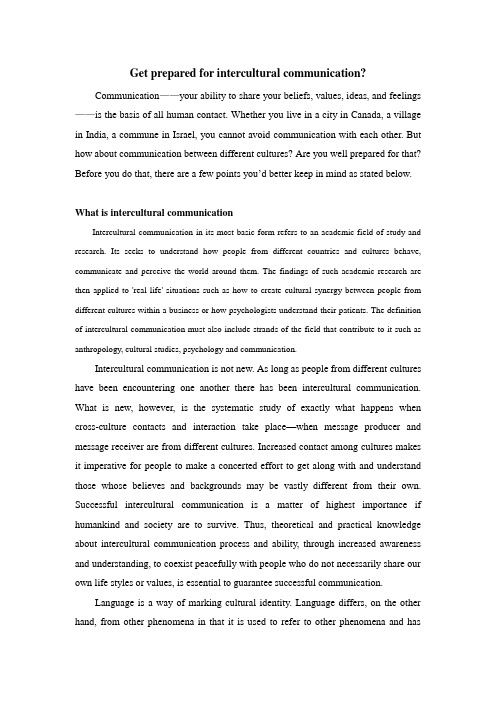
Get prepared for intercultural communication?Communication——your ability to share your beliefs, values, ideas, and feelings ——is the basis of all human contact. Whether you live in a city in Canada, a village in India, a commune in Israel, you cannot avoid communication with each other. But how about communication between different cultures? Are you well prepared for that? Before you do that, there are a few points you’d better keep in mind as stated below.What is intercultural communicationIntercultural communication in its most basic form refers to an academic field of study and research. Its seeks to understand how people from different countries and cultures behave, communicate and perceive the world around them. The findings of such academic research are then applied to 'real life' situations such as how to create cultural synergy between people from different cultures within a business or how psychologists understand their patients. The definition of intercultural communication must also include strands of the field that contribute to it such as anthropology, cultural studies, psychology and communication.Intercultural communication is not new. As long as people from different cultures have been encountering one another there has been intercultural communication. What is new, however, is the systematic study of exactly what happens when cross-culture contacts and interaction take place—when message producer and message receiver are from different cultures. Increased contact among cultures makes it imperative for people to make a concerted effort to get along with and understand those whose believes and backgrounds may be vastly different from their own. Successful intercultural communication is a matter of highest importance if humankind and society are to survive. Thus, theoretical and practical knowledge about intercultural communication process and ability, through increased awareness and understanding, to coexist peacefully with people who do not necessarily share our own life styles or values, is essential to guarantee successful communication.Language is a way of marking cultural identity. Language differs, on the other hand, from other phenomena in that it is used to refer to other phenomena and hasusually to be used to refer beyond itself. Language in use by particular speakers is constantly referring beyond itself irrespective at the intentions of the speaker: language cannot be used without carrying meaning and referring beyond itself, even in the most sterile environment of the foreign language class. The meanings of a particular language point to the culture of a particular social group, and the analysis of those meanings—their comprehension by learners and other speakers—involves the analysis and comprehension of that culture. It disregards the nature of language to treat language independently of the culture which it constantly refers to. No doubt all language teaching contains some explicit reference to the culture; the whole from which the particular language is taken. The interdependence of language learning and culture learning is so evident that we can draw the conclusion that language learning is culture learning and consequently that language teaching is culture teaching.What are elements of human communicationElements of human communication are the context of the communication, the participants, the messages being communicated, the channels through which the communication occurs, the presence or absence of “noise”, and the verbal and nonverbal responses known as feedback.As receivers attempt to decode the meaning of messages, they are likely to give some kind of verbal or nonverbal response. Paying attention to both verbal and nonverbal feedback allows us to behave in ways that increase understanding of our messages. Feedback serves useful functions for both senders and receivers: in provides senders with the opportunity to measure how they are coming across, and it provides receivers with the opportunity to exert some influence over the communication process. Verbal communication is, "the ways in which you use the words in a language to generate meaning." It is essentially any communication that uses language, whether it is oral or written. Symbols are used throughout verbal communication as sounds combined to make words-they symbolize ideas, thoughts, etc. Without symbols, communication would be meaningless.How High-context and Low- context cultures influence intercultural communicationAccording to Hall, cultures differ on a continuum that ranges from high to low context. High-context cultures prefer to use high- context messages which are implicit, indirect, conveyed primarily through the context or the social situation. Low-context cultures prefer to use low-context messages, in which the majority of the information is vested in the explicit code. There are manifestations of high-context and low-context cultures that influence intercultural communication. for example, members of low-context cultures expect messages to be detailed, clear-cut, and definite. If there are not enough data, or if the point being made is not apparent, members of these cultures will ask very blunt, even curt, questions. They feel uncomfortable with the vagueness and ambiguity often associated with limited data. On the other hand, high-context people are not apt to become impatient and irritated when low- context people insist on giving them information they don’t need. The communication differences between high-context and low-context cultures are also apparent in the manner in which each approach conflict. For example, because high-context cultures tend to be less open, they hold that conflict is damaging to most communication encounters. For them, conflict should be dealt with discreetly and subtly.What is the relationship between language and cultureAccording to Sapir (1921), “language is a purely human and non-instinctive method of communicating ideas, emotions and desire by means of voluntarily produced symbols.” Language is a part of culture and a part of human behavior. It is obvious that language plays a paramount role in developing, elaborating and transmitting culture and language, enabling us to store meanings and experience to facilitate communication. The function of language is so important in communication that it is even exaggerated by some scholars. The most famous one is the hypothesis of linguistic determinism concerning the relationship between language and culture, which Nida regards as misconceptions constituting serious difficulties forcross-cultural understanding.Each culture has its own peculiarities and throws special influence on the language system. For example, referring to the same common domestic animal, English chooses the word “dog”, while Chinese has its own character“狗”; Chinese has the phrase“走狗”while English has the e xpression “running dog”, but the meanings attributed to the two expressions are completely different according to Chinese culture and Western culture respectively. To Westerners, “running dog” has a positive meaning since the word “dog”, in most cases, is associated with an image of an animal pet-the favorite friend, thus they have the phrases “lucky dog”(幸运儿), “top dog”(胜利者), “old dog”(老手), “gay dog”(快乐的人), and it is usually used to describe everyday life and behavior, as in “Love me, love my dog”(爱屋及乌),“Every dog has its day”(凡人皆有得意日). But in Chinese“走狗”refers to a lackey, an obsequious person. Since Chinese associates derogatory meaning to the character“狗”depending on the cultural difference, Chinese has such expressions as “狗东西”,“狗腿子”,“狗仗人势”,“狗胆包天”,“狗嘴里吐不出象牙”,“狼心狗肺”,“痛打落水狗”,“狗急跳墙”.We can obviously see that the meaning attributed to language is cultural-specific.A great deal of cross-cultural misunderstanding occurs when the “meanings” of words in two languages are assumed to be the same, but actually reflect different cultural patterns. Some are humorous as when a Turkish visitor to the U.S. refused to eat a hot dog because it was against his beliefs to eat dog meat. Some are much more serious as when a French couple on a trip to China took their pet poodle into a restaurant and requested some dog food. The dog was cooked and returned to their table on a platter!We can summarize the relationship between culture and language as the following: language is a key component of culture. It is the primary medium for transmitting much of culture. Without language, culture would not be possible. Children learning their native language are learning their own culture; learning a second language also involves learning a second culture to varying degrees. On the other hand, language is influenced and shaped by culture. It reflects culture. Cultural differences are the most serious areas causing misunderstanding, unpleasantness andeven conflict in cross-cultural communication.What are cultural stereotypes and prejudicesStereotypes consist basically in shared beliefs or thoughts about a particular human group. A stereotype is an ensemble of characteristics that sums up a human group usually in terms of behaviour, habits, etc.The objective of stereotypes is to simplify reality: "they are like that". Bosses are tyrannical; these people are lazy, those are punctual; the people in that part of town are dangerous - one or some of them may have been, but all? Sometimes we use stereotypes about the group to which we feel we belong in order to feel stronger or superior to others. (Or, indeed, to excuse faults in ourselves - "What can I do about it? We are all like that!"). Stereotypes are usually based on some kind of contact or images that we have acquired in school, through mass media or at home, which then become generalised to take in all the people who could possibly be linked.A prejudice is a judgement we make about another person or other people without really knowing them. Prejudices can be negative or positive in character. Prejudices are learned as part of our socialisation process and they are very difficult to modify or eradicate. Therefore it is important that we are aware that we have them.To explain this concept more directly it could help to examine how deeply we know all of our friends. We may have different friends for different occasions, for going to the cinema, going walking, helping with homework, playing football, going to concerts. Do we know what music our football friends enjoy? Or do we just guess? Making assumptions is easy and common. If it is that simple to make assumptions about friends, think how easy it is to make false judgments about people you don't know.How to adapt to a new cultureThere are a few stages for you to experience if you want to experience a new culture. And later I’ll give some practical suggestions for you to better settle in a new culture.HoneymoonVisitors in the honeymoon stage view the new culture as something exciting and fresh. Differences in culture and appearance seem fascinating, while similarities stand out as common bonds. The energy associated with this stage often leads visitors to explore their surroundings and treat their new environment as a source of joy. The honeymoon can last anywhere from a few days to a few weeks. Vacationers and similar casual visitors rarely move past this stage, since the length of their stay is limited and they focus their activities in service-oriented areas such as hotels and tourist sites.RejectionAs the first stage fades, the visitor confronts feelings of frustration and resentment. Cultural and language differences create complications in mundane tasks. Feelings of inadequacy predominate, and the reality of the visitor's new life starts to hit home. Disappointments tend to build upon each other, while members of the surrounding culture may treat the visitor like a child or a fool. The visitor becomes extremely sensitive and may develop significant fears about the surrounding culture. IsolationThe disillusionment created by the second stage causes the visitor to retreat into a shell. He becomes extremely critical of the surrounding culture and thinks of his home culture in idealized terms. Homesickness can become pronounced and emotional anxiety increases dramatically. The visitor may experience crying jags, changes in sleep patterns and continued irritation over comparatively minor issues. The exact length of this stage varies from case to case, but often lasts from one to two months, according to Bellini.Assimilation and AcceptanceIn order to function, the visitor begins adapting to his new circumstances. Slowly, the new culture begins to make more sense. He finds fellow countrymen who have adapted to their new culture, or makes new friends in the surrounding culture who help him feel more at home. He integrates more readily into his surroundings: basic tasks become easier and the local language and customs present fewer problems thanthey did before. Eventually, he's able to function in both his new and old circumstances with ease, balancing his cherished past with the promise of his future. Here are some suggestions for you:Maximize exposure to the host culture before departure. Read about everyday life in the destination. Visit appropriate hometown ethnic restaurants and grocery stores to gain exposure to the new culture's food and develop familiarity with the flavors. In addition to gaining as much linguistic proficiency as possible, develop familiarity with popular music and entertainment in the host country. Watch films and stream radio broadcasts or music videos for exposure.Upon arrival, develop a daily routine as quickly as possible. Establish a sleep schedule, eat healthfully and exercise at regular times. Make a point to establish familiarity by finding favorite local coffee shops and parks to avoid culture shock that can arise due to feelings of complete loss of control over life. Some choices may be limited due to language barriers or having to adjust to being the guest of a host family. But maximize available choices through reading materials and ways to spend free time.Maintain relationships with family and friends at home through video chat, letters and email. Create a website or share photographs electronically to engage longtime friends in your experience. Building new friendships in the host culture can also be critical to happiness. Be friendly and invite schoolmates, workmates or neighbors to go walking or out for coffee.Strive to maintain a flexible, positive attitude. Living in a foreign country is an invaluable opportunity full of excitement and challenges. Though it may seem extremely difficult, remember to be a student of the host country's way of life. Laugh at your social or linguistic mistakes. Experience new foods and traditions with an open mind. Flexibility is a critical component of successful adjustment.When you get all theses questions settled, you will be on your smooth way to experiencing a rather new culture and being a qualified cross-cultural communicator.。
- 1、下载文档前请自行甄别文档内容的完整性,平台不提供额外的编辑、内容补充、找答案等附加服务。
- 2、"仅部分预览"的文档,不可在线预览部分如存在完整性等问题,可反馈申请退款(可完整预览的文档不适用该条件!)。
- 3、如文档侵犯您的权益,请联系客服反馈,我们会尽快为您处理(人工客服工作时间:9:00-18:30)。
1. Then try to explain why people in countries like Japan and China often refuse to say “ no” directly. In the English language,“yes”may mean very differently in different situations. Both Japan and China are regarded as cultures in which people tend to convey messagesin an implicit way. The most conspicuous case is the way they say —no II . People from Japan and China often refuse to say —no II directly. The reasons can be accounted in many ways. Firstly, Japan and China are humble cultures which teach their people to be modest and mild. They always keep off expressing strong emotions against the other party; instead, they prefer to issue disapprovals tactfully by implication. Besides, in Japanese and Chinese cultures, —face I is highly valued in the course of communication. People are bound to protect their own face from threatening; meanwhile, they feel obliged not to threaten the other party ‘fasce. Still, harmony has been attached great importance to in Japanese and Chinese cultures. People are expected to make every effort to keep a harmonious relationship with each other. They have to try their best to avoid being aggressive which may result in direct conflict.2. Different meanings of the color terms in Chinese and English culture RED/ 红色Chinese: ① festive, jubilant, celebrate e.g. 红娘,红火② advancing,bright e.g. 红军,红色政权③ successful, smooth e.g. 红人,走红④beautiful, nice e.g.红颜,红妆English:① violent, cruel e.g. red revenge; a red battle ② armed revoluti on e.g.: a red revolutio n; ③ dan ger, tension e.g. a red adventure story; red alert; a red flag ③ profligate, immoral e.g. a red waste of his youth; GREEN/绿色Chin ese:①you ng, e.g.绿窗(指少女闺阁);红男绿女②kni ghtly, chivalrous, feral e.g.绿林好汉;绿林大盗③ low-classified, shamefule.g.:戴绿帽子English:① young e.g. in the green; a green ole age ② fresh, new e.g. a gree n wound; gree n recollecti on; keep the memory gree n ③ lack of experience e.g.: a green hand; green recruits ④ wealth, money e.g.: In America n political electi ons the can didates that win are usually the ones who have green power backing them ⑤ jealous, envy e.g.: gree n-eyedY ELLOW/ 黄色Chinese:① royalty, power e.g.黄袍,黄马褂,黄榜② erotic, base, sen sual e.g.黄色书干刊English:① erotic, sensual, base e.g. yellow journalism; yellow back; yellow press ② funk, sneak, spiritless e.g. yellow lived; yellow dog; WHITE/白色Chi nese:WHITE/ 白色① funeral, sadness e.g.红白喜事② failure, unvalued, foolish e.g.白干,白旗,白搭,白痴③tricky, crafty e.g.白脸④ politically reacti onary e.g.:白专道路,白匪English:① pure, bright, happy, cleanness e.g. whit soul; a white wedding ② faithful, honest e.g. a white spirit; white hand white man ③ good luck, fortune e.g. a white day; days marked with a white stone ④ legal, no harmful e.g. white market; white list a white litBLACK/黑色Chi nese:① sadness, funeral e.g.葬礼上所佩带的黑纱② serious, solemn e.g. “黑脸”包公③ secretly, tricky e.g.黑幕,黑名单④ illegal, crimes, evil e.g.黑手,黑店,黑市,黑货English:① death, disaster, unfortunate e.g.: Black Mass; black world black death ② evil, crimes e.g. black deed; Black Man black guard; B-hands ③ angry, depressed e.g. black dog; a black look PURPLE/紫色Chinese:① nobility, dignity e.g.紫气东来,紫禁城English:① nobility, dignity e.g. be born in the purple; marry in the purple; be raised to the purplePINK/粉红Chinese①symbolized for girls e.g.六宫粉黛无颜色人面桃花相映红② illegal or unu sual sen sual relati on ships e.g.桃色事件English:① homosexual e.g. a product developed for the pink customer ② upper class e.g. pink lady pink teaP 169.(4). What does the author thi nk is the reas on able way to react to cultural differe nces? We should know that the way the other speaks may be differe nt from our way of speaki ng because he or she must have had a differe nt cultural upbringing. We shouldn j udge the other according to our own sta ndards of what is an acceptable com muni cati on style.(8). How is “ Ping-Pong‘ conversational style different from “ Bowling” style?In an American Ping-Pong' conversation, one person has the ball and then hits it to the other side of the table. The other player hits the ball back and the game continues. Each part of the conversation follows this patter n: the greet ing and the ope ning, the discussi on of a topic, and the closing and farewell. However, in a Japanese Bowling” conversation, each participant waits politely for a turn and knows exactly when the time is right to speak. That is, they know their place in line. In Japanese conv ersati on, long sile nces are tolerated. For America ns, eve n two orthree sec onds of sile nee can become un comfortable.Dialogue 1Questions 1. What does the Chinese employee mean by saying “I see ”Does it mean agreeme nt, accepta nee or promise?By saying “see” th e Chinese employee means agreement which is “Iagree that there is need for keeping the production line running onSaturday. ”2. To the direct request “ Can you come in on Saturday ” , what should Chi nese employee say to avoid further mis un dersta ndi ng?To avoid further misunderstanding that caused by saying “ see ” theChi nese employee should say: “1 ‘ d love to, but I‘ ve promised my son tcelebrate his birthday with him on this Saturday. I ‘ m sorry I may not able to come in3. Why does the American boss fail to understand what the Chinese employee implies by saying “lt?smy sons birthday ”Why does the Chinesefail to say “ no” ?The American boss fails to understand what the Chinese employee actually means by saying ft ‘ s my son ‘ s birthday ”. because he is cultivated in a low-c on text culture in which meaning comes from the words being exchanged and messages are expected to be detailed, clear-cut, and definite. However, the Chinese employee fails to say no” because he comes from a high-c on text culture in which meaning depends very upon the setting and any speech act that may threaten other people 'face is usually avoided as much as one can. In gen eral, the Chi nese mode of com muni cati on is ofte n in direct and implicit while the Western mode of com muni catio n tends to be direct andexplicit.。
